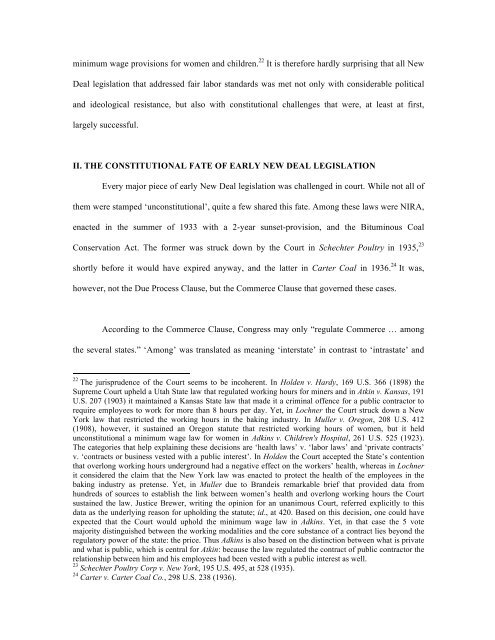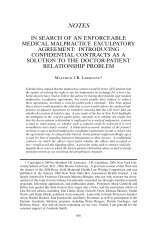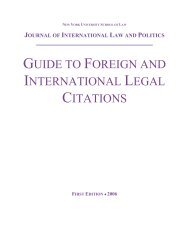Jasper Finke, Crisis and Law - New York University School of Law
Jasper Finke, Crisis and Law - New York University School of Law
Jasper Finke, Crisis and Law - New York University School of Law
You also want an ePaper? Increase the reach of your titles
YUMPU automatically turns print PDFs into web optimized ePapers that Google loves.
minimum wage provisions for women <strong>and</strong> children. 22 It is therefore hardly surprising that all <strong>New</strong><br />
Deal legislation that addressed fair labor st<strong>and</strong>ards was met not only with considerable political<br />
<strong>and</strong> ideological resistance, but also with constitutional challenges that were, at least at first,<br />
largely successful.<br />
II. THE CONSTITUTIONAL FATE OF EARLY NEW DEAL LEGISLATION<br />
Every major piece <strong>of</strong> early <strong>New</strong> Deal legislation was challenged in court. While not all <strong>of</strong><br />
them were stamped ‘unconstitutional’, quite a few shared this fate. Among these laws were NIRA,<br />
enacted in the summer <strong>of</strong> 1933 with a 2-year sunset-provision, <strong>and</strong> the Bituminous Coal<br />
Conservation Act. The former was struck down by the Court in Schechter Poultry in 1935, 23<br />
shortly before it would have expired anyway, <strong>and</strong> the latter in Carter Coal in 1936. 24 It was,<br />
however, not the Due Process Clause, but the Commerce Clause that governed these cases.<br />
According to the Commerce Clause, Congress may only “regulate Commerce … among<br />
the several states.” ‘Among’ was translated as meaning ‘interstate’ in contrast to ‘intrastate’ <strong>and</strong><br />
22<br />
The jurisprudence <strong>of</strong> the Court seems to be incoherent. In Holden v. Hardy, 169 U.S. 366 (1898) the<br />
Supreme Court upheld a Utah State law that regulated working hours for miners <strong>and</strong> in Atkin v. Kansas, 191<br />
U.S. 207 (1903) it maintained a Kansas State law that made it a criminal <strong>of</strong>fence for a public contractor to<br />
require employees to work for more than 8 hours per day. Yet, in Lochner the Court struck down a <strong>New</strong><br />
<strong>York</strong> law that restricted the working hours in the baking industry. In Muller v. Oregon, 208 U.S. 412<br />
(1908), however, it sustained an Oregon statute that restricted working hours <strong>of</strong> women, but it held<br />
unconstitutional a minimum wage law for women in Adkins v. Children's Hospital, 261 U.S. 525 (1923).<br />
The categories that help explaining these decisions are ‘health laws’ v. ‘labor laws’ <strong>and</strong> ‘private contracts’<br />
v. ‘contracts or business vested with a public interest’. In Holden the Court accepted the State’s contention<br />
that overlong working hours underground had a negative effect on the workers’ health, whereas in Lochner<br />
it considered the claim that the <strong>New</strong> <strong>York</strong> law was enacted to protect the health <strong>of</strong> the employees in the<br />
baking industry as pretense. Yet, in Muller due to Br<strong>and</strong>eis remarkable brief that provided data from<br />
hundreds <strong>of</strong> sources to establish the link between women’s health <strong>and</strong> overlong working hours the Court<br />
sustained the law. Justice Brewer, writing the opinion for an unanimous Court, referred explicitly to this<br />
data as the underlying reason for upholding the statute; id., at 420. Based on this decision, one could have<br />
expected that the Court would uphold the minimum wage law in Adkins. Yet, in that case the 5 vote<br />
majority distinguished between the working modalities <strong>and</strong> the core substance <strong>of</strong> a contract lies beyond the<br />
regulatory power <strong>of</strong> the state: the price. Thus Adkins is also based on the distinction between what is private<br />
<strong>and</strong> what is public, which is central for Atkin: because the law regulated the contract <strong>of</strong> public contractor the<br />
relationship between him <strong>and</strong> his employees had been vested with a public interest as well.<br />
23<br />
Schechter Poultry Corp v. <strong>New</strong> <strong>York</strong>, 195 U.S. 495, at 528 (1935).<br />
24<br />
Carter v. Carter Coal Co., 298 U.S. 238 (1936).
















